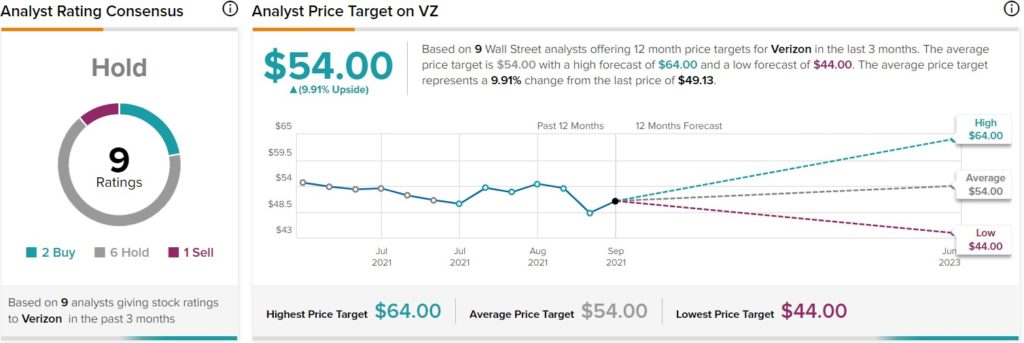The signs that we’re heading into a recession are mounting. For instance, the yield curve has inverted, suggesting investors believe that the U.S. Federal Reserve will need to drop rates sharply in the medium term to sustain long-term economic growth. Additionally, the S&P 500 (SPX) has drawn down by more than 20%, officially declaring a bear market.
Nevertheless, there are still ways to run a profitable investment portfolio during a market downturn. Wells Fargo (WFC) released a portfolio of stocks that could survive a recession. The bank’s investment thesis is centered around a risk-off sentiment.
According to one of the bank’s analysts, Chris Harvey: “For equities, this [a recession] would mean more volatility, a better bid for risk-aversion, and a decay of cyclicality until the easing cycle begins – therefore, our shift on the reopening names.”
Whether Harvey is accurate or not remains to be seen. However, I liked a few of the names on the list and decided to opine on three of the stocks that I’m bullish on.
Verizon (VZ)
Verizon is a defensive stock, which is ideal for the current market environment. The firm’s push into 5G and its sale of Yahoo sees to it that it’s more operationally efficient than it used to be a few years ago.
Despite some concerns that Verizon’s 2022 full-year earnings will come in low, the company has illustrated earnings momentum after recording EPS of $1.35 in its first-quarter earnings report. Furthermore, Verizon’s earnings from continuing operations are on a solid growth trajectory, at a five-year compound annual growth rate of 11.51%, implying consistent organic growth.
Another aspect that Verizon could benefit from is its dividend properties. High-dividend stocks tend to outperform low or non-dividend-paying stocks in a recession as investors lean towards “guaranteed-yield” securities.
Verizon’s forward yield of 5.2% means that it certainly fits the high-dividend yield bracket. Thus, if the theory holds, Verizon stock could be systemically supported.

Turning to Wall Street, Verizon earns a Hold consensus rating based on two Buys, six Holds, and one Sell rating assigned in the past three months. The average Verizon stock price target of $54 implies 9.9% upside potential.

McDonald’s (MCD)
McDonald’s is a non-cyclical consumer goods company that holds down a large market share. A company such as McDonald’s has the capacity to weather the economic storm we’re in, as it provides a low-cost product to a loyal customer base.
Furthermore, the company has achieved economies of scale at a gross profit margin of 54.54%, providing it with bargaining power over its suppliers. Thus, rising input costs won’t be of mass concern to McDonald’s.
Also, McDonald’s stock is relatively undervalued. First of all, the stock’s price-to-earnings ratio is at a 7.48% normalized discount to its five-year average, suggesting that the market has not fully priced its earnings per share just yet.
In addition, its PEG ratio of 0.67x implies that the marketplace underappreciates the company’s EPS growth. Intertwining these two data points holistically conveys a clear value gap in play.
Turning to Wall Street, McDonald’s earns a Strong Buy consensus rating based on 23 Buys and four Hold ratings assigned in the past three months. The average McDonald’s stock price target of $279.64 implies 17.1% upside potential.

Coca-Cola (KO)
Once a Warren Buffett favorite, Coca-Cola is considered an inflation-resilient stock due to its market stronghold and its robust organic growth.
In its latest financial quarter, the firm posted an 18% year-over-year increase in organic sales, which led to a $0.06 per share earnings target beat. The bulk of the firm’s sales growth has been in North America (39%) and Europe (22%), conveying a diverse revenue mix, which smoothes top-line earnings. Geographic smoothing of top-line earnings de-risks the company’s business model, which could act as a defense mechanism during an economic downturn.
Furthermore, Coca-Cola sports high-quality attributes. High-quality attributes refer to balance sheet strength, return metrics, market share, and operational efficiency.
Coca-Cola’s return on equity ratio of 45.61%, its interest coverage of 8.91x, and its levered free cash flow margin of 17.5% all prove that the company checks out as a high-quality stock. Thus, Coca-Cola stock could gain market-based support during an economic downturn.
Turning to Wall Street, Coca-Cola earns a Strong Buy consensus rating based on 12 Buys and four Hold ratings assigned in the past three months. The average KO stock price target of $71 implies 19.45% upside potential.

Concluding Thoughts
Investing during a recession is a tough job. However, according to Wells Fargo, the three stocks mentioned in the article could provide investors with economic downturn protection, as they exhibit attractive quality and dividend prospects.









